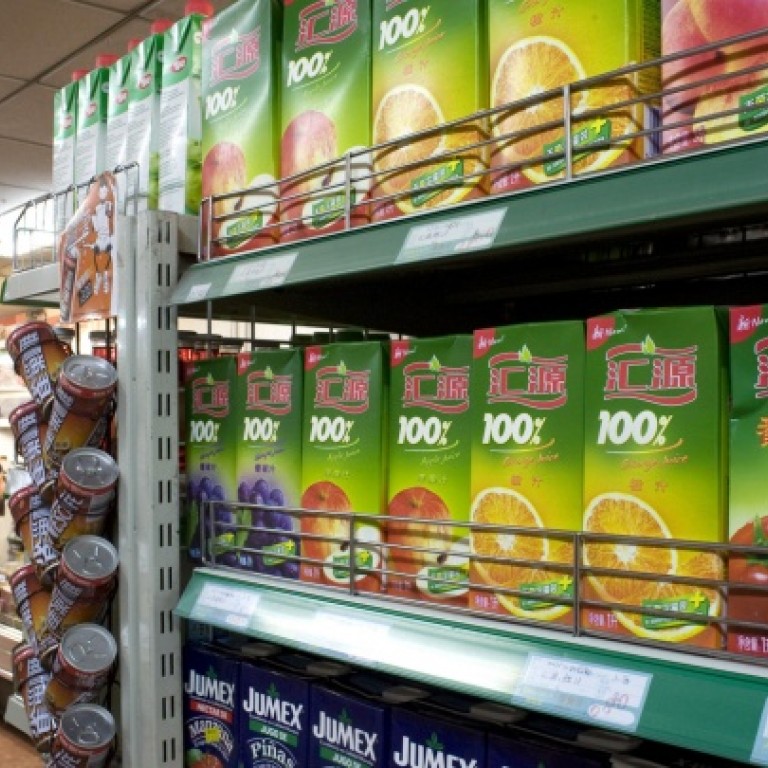
Juice brand's sweetheart deal gives shareholders bitter laugh
Huiyuan Juice struggles to make profits, but one of its suppliers, owned by the brand's founder, has been doing so well Huiyuan wants to buy it
Zhu Xinli, owner of Huiyuan Juice, once quipped: "I'm very good at making money." For the minority shareholders of the mainland's top juice brand, that would sound like a bitter joke. More so, because it is at their expense.
Since its listing in 2007, Huiyuan has gone from bad to worse. It reported 16 million yuan of profits last year, but that included 350 million yuan of government subsidy and fair value gains.
Huiyuan's management always blames rising raw material costs and fierce competition. Recently, however, shareholders came to learn that a puree and concentrate maker owned by Zhu made a profit of 358 million yuan (HK$449 million) last year. And guess what, 80 per cent of its products were sold to Huiyuan.
The puree maker's astounding success came to light as Huiyuan proposed to buy the company from Zhu for HK$4.9 billion. The reason cited for the planned acquisition: it will boost Huiyuan's earnings per share by 7.7 times because of "significant cost savings".
The Hong Kong stock exchange, incidentally, allowed Huiyuan to list with a heavy dose of connected transactions. All subsequent raw material contracts over the years have been duly approved by independent directors.
Let us return to the acquisition. First, why is Zhu selling? Improving Huiyuan's profitability is not the real reason. Zhu has actually no choice. Under a three-year agreement with Huiyuan's second-largest shareholder, he has to sell Huiyuan the puree maker or spend a fortune buying the No 2 shareholder's 23 per cent stake in Huiyuan. The deadline is July.
Second, what is he getting out of it? According to the announcement, the company is to issue HK$3.4 billion of new shares and convertible bonds to Zhu. It will also take over HK$1.5 billion of the puree maker's liabilities.
On the surface, Zhu is raising its commitment to the debt-ridden Huiyuan by increasing his holding from 44 per cent to 66 per cent. But actually, Zhu is getting a HK$1.5 billion cash transfer from the deal.
Buried in the 35-page announcement is a "restructuring" arrangement between two of Zhu's wholly owned subsidiaries in 2011. Let's call them subsidiaries A and B. Apparently A sold the puree maker to B for HK$1.5 billion cash. To finance the deal, B took out a bank loan.
Huiyuan is now buying B, including its asset (the puree maker) and liability (the HK$1.5 billion loan). Once the deal is completed, B will pay A the HK$1.5 billion, or in other words pay Zhu. In a nutshell, Huiyuan takes over B's loan obligation to pay Zhu HK$1.5 billion of cash.
Third, what exactly is Huiyuan buying? The announcement is vague on the profitability of the puree maker, as its three-year financial summary is not provided. All it says is that the puree maker made a consolidated net profit of 358 million yuan in 2012, a 30 per cent growth from 2011.
Given that 80 per cent of its sales and gross profit comes from supplying raw material to Huiyuan, Huiyuan's annual reports could provide more details here.
Huiyuan significantly increased its raw material purchases in 2012 "in anticipation of a new product rollout in the first half of 2013", according to its 2012 annual report. The result: an increase of its raw material turnover days from 114 to 184 days, a record high; and a 53 per cent rise in its raw material inventory to 1.1 billion yuan.
Over 43 per cent of this raw material was brought from Zhu. Interestingly enough, while the purchases grew 21 per cent to 1.25 billion yuan in 2012, the amount it owed Zhu in these purchases doubled to 890 million yuan. Whether the sharp increase in raw material purchase by Huiyuan has anything to do with the growth in profits of Zhu's puree maker is for the company to explain.
Fourth, how much is Huiyuan paying? The company considers the 11 times historical price-earnings ratio fair, comparing it to the 12 times paid by Asian Citrus in acquiring a puree maker in 2010. Asian Citrus, which today generates over half of its gross profit from the puree maker, is now trading at 3.3 times the price-earnings ratio.
Clearly there is not much for minority shareholders to cheer about. But they do not have a choice. Huiyuan will either keep paying Zhu through raw material purchase orders or through a one-off asset purchase. Zhu is good at making money, all right.

